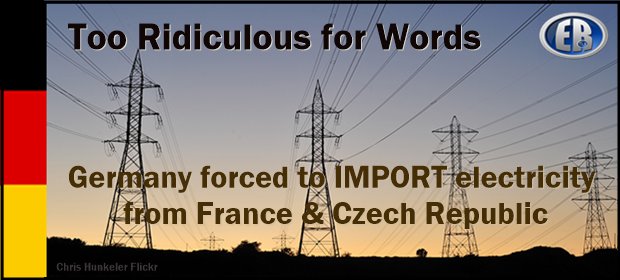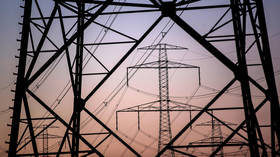
Germany forced to rely on imported electricity – Bild
The country cannot meet its own needs in the aftermath of its nuclear phase-out, the outlet has claimed
RT
Germany has had to ramp up electricity imports in the first six months of the year, after the government decided to shut down the country’s last remaining nuclear power plants in favor of renewable energy sources, the news outlet Bild reported on Monday.

From January 1 to June 12, the EU’s largest economy relied on power supplies from neighboring countries, the outlet said, citing the cabinet’s response to a parliamentary inquiry.
Germany can no longer meet its demand with domestically generated power, the report stated, due to a green energy policy “disaster” that saw nuclear plants closed in favour of renewables. Berlin now relies on imports of electricity produced at French atomic facilities and on supplies generated at coal plants in the Czech Republic.
“According to publicly available data, Germany has turned from an exporter of electricity into an importer. This is most likely due to the abandonment of nuclear power plants,” energy expert Andre Tess told TASS news agency.
German industry executives earlier sounded the alarm over looming electricity shortages that could endanger the competitiveness of Germany as an industrial hub.
“As an industrial location, Germany has a serious problem. We don’t have as much energy available as we need,” the head of energy firm RWE, Markus Krebber, warned last month.
“This gap leads to high prices and thus to justified concerns about competitiveness,” he said, adding: “we are seeing the first signs of de-industrialization.”
Germany pledged to abandon nuclear power after Japan’s 2011 Fukushima catastrophe. In April, Berlin shut down its last three nuclear power stations, ending a six-decade nuclear program in favor of fully renewable electricity generation by 2035.
The initial plan was to use more Russian gas during the transition period via the Nord Stream pipelines, which were built to deliver cheap fuel from Russia. Prior to the conflict in Ukraine, Germany met up to 40% of its demand with gas from the sanctioned country. However, the sabotage of the natural gas pipelines and Western penalties imposed on Moscow prompted Berlin to search for alternative supplies.
Last year, Berlin replaced some of its Russian gas with imports of LNG from the US and the Middle East. But economists have warned that it would take years for Germany to fully substitute Russian supplies with other sources of energy.
************
Source

••••
The Liberty Beacon Project is now expanding at a near exponential rate, and for this we are grateful and excited! But we must also be practical. For 7 years we have not asked for any donations, and have built this project with our own funds as we grew. We are now experiencing ever increasing growing pains due to the large number of websites and projects we represent. So we have just installed donation buttons on our websites and ask that you consider this when you visit them. Nothing is too small. We thank you for all your support and your considerations … (TLB)
••••
Comment Policy: As a privately owned web site, we reserve the right to remove comments that contain spam, advertising, vulgarity, threats of violence, racism, or personal/abusive attacks on other users. This also applies to trolling, the use of more than one alias, or just intentional mischief. Enforcement of this policy is at the discretion of this websites administrators. Repeat offenders may be blocked or permanently banned without prior warning.
••••
Disclaimer: TLB websites contain copyrighted material the use of which has not always been specifically authorized by the copyright owner. We are making such material available to our readers under the provisions of “fair use” in an effort to advance a better understanding of political, health, economic and social issues. The material on this site is distributed without profit to those who have expressed a prior interest in receiving it for research and educational purposes. If you wish to use copyrighted material for purposes other than “fair use” you must request permission from the copyright owner.
••••
Disclaimer: The information and opinions shared are for informational purposes only including, but not limited to, text, graphics, images and other material are not intended as medical advice or instruction. Nothing mentioned is intended to be a substitute for professional medical advice, diagnosis or treatment.





Leave a Reply